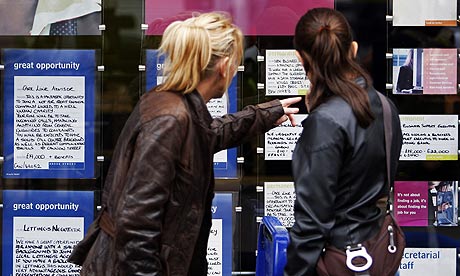
Unemployment rose by less than feared in September, leaving the headline rate at 7.9%. Photograph: Luke MacGregor/Reuters
Unemployment rose by less than feared in September, with the number of people signing up for jobless benefit increasing by the smallest amount in 16 months.
The Office for National Statistics (ONS) reported this morning that the claimant count rose by 20,800 in September, below economists' expectations of a 24,500 rise. This means there are now 1.6268 million people out of work and claiming benefit in Britain, the highest since April 1997.
The wider International Labour Organization (ILO) measure of unemployment also came in lower than expected, and did not breach the 2.5 million mark as feared. It rose by 88,000 in the three months to August, taking the total out of work to 2.469 million. This leaves the headline rate of unemployment at 7.9%.
UK firms are continuing to shed staff in the face of the deepest recession since the second world war. There was no end in sight for the youth unemployment crisis, with 946,000 16-24-year-olds out of work. But economists said there were still signs for optimism, including a fall in the number of people who have been claiming unemployment benefit for over six months.
"The latest UK labour market data looks pretty encouraging. For a start, unemployment is rising at a much slower rate than before," said Vicky Redwood of Capital Economics.
But there was little hope that unemployment will stop rising anytime soon. Alan Clarke of BNP Paribas warned that the economy will continue to shed jobs "until the economy is growing back at potential or above, and that is still some way off".
And Alan Tomlinson, partner at UK-licensed insolvency practitioners Tomlinsons, railed against those who might believe that the downturn is abating. He warned that many businesses are still fighting to survive.
"Turnover is depressed, cash flow is uncertain and margins are squeezed so in order to stay afloat companies are having to make economies, the first of which, unfortunately, is to reduce headcount. And in many cases even that won't be enough to stop them going out of business.
"The sounds emerging from the ivory towers of the City are that the worst is now behind us and the economy is beginning to improve. Tell that to the companies that we're speaking to day in, day out."
There had been fears that youth unemployment would hit the one million mark today. Although that was avoided, charities called for more action to help 16-24-year-olds avoid becoming a "lost generation".
"There is no room for complacency. We must stop the unemployed becoming the unemployable. The monthly price tag is £100m but the human cost is immeasurable," said Martina Milburn, chief executive of the Prince's Trust.
"Every one of those unemployed is a real person with real talents that can make a difference to this country."
The better-than-expected data sent the pound rising against other currencies, reaching $1.5988 against the dollar and €1.0739 against the euro.
Figures released earlier by the Chartered Institute of Personnel and Development (CIPD) showed that men have been more badly affected by rising unemployment during the recession than women. Black men have been particularly hit, with over 18% currently out of work.
The ONS also reported that those who have held onto their jobs through the recession are also being hit. Average pay is rising by 1.9% compared with a year ago, the lowest annual growth since records began in 2001.

No comments:
Post a Comment